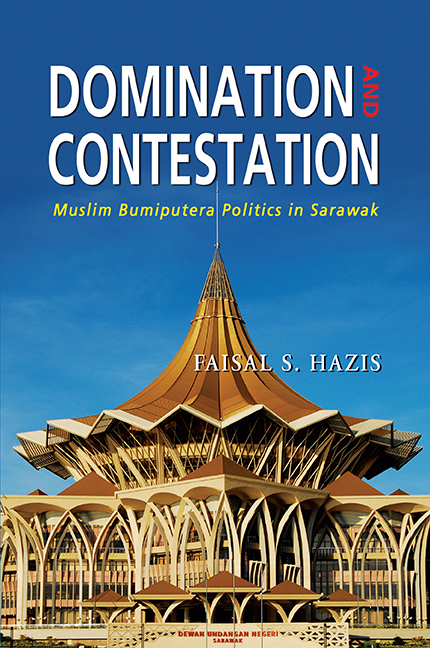Book contents
- Frontmatter
- Contents
- List of Tables
- List of Figures
- Preface
- List of Abbreviations
- 1 Introduction
- 2 State and Social Forces in Sarawak
- 3 The Resurgence of Muslim Bumiputera Politics, 1970–81
- 4 Years of Turbulence, 1981–87
- 5 Consolidation and Domination of the Muslim Bumiputera, 1987–2003
- 6 Muslim Bumiputera Politics in the Post-Mahathir Era, 2003–06
- 7 The Coastal Malays of Southwest Sarawak: A Case Study of the Muslim Bumiputera's Political Domination
- 8 Conclusion
- Postscript
- Appendices
- Bibliography
- Index
- About the Author
- Frontmatter
- Contents
- List of Tables
- List of Figures
- Preface
- List of Abbreviations
- 1 Introduction
- 2 State and Social Forces in Sarawak
- 3 The Resurgence of Muslim Bumiputera Politics, 1970–81
- 4 Years of Turbulence, 1981–87
- 5 Consolidation and Domination of the Muslim Bumiputera, 1987–2003
- 6 Muslim Bumiputera Politics in the Post-Mahathir Era, 2003–06
- 7 The Coastal Malays of Southwest Sarawak: A Case Study of the Muslim Bumiputera's Political Domination
- 8 Conclusion
- Postscript
- Appendices
- Bibliography
- Index
- About the Author
Summary
In Malaysian politics, Sarawak is popularly known as the Barisan Nasional's (BN) fortress. This connotation is derived from the ruling party's ability to dominate both the parliamentary and negeri elections in Sarawak after the first direct elections were introduced in 1970. Initially, the ruling party faced an uphill battle in cajoling Sarawak's electorate as evident from its dismal performance in the 1970 election; it only won nine parliamentary seats and less than half of the Council Negeri seats. The ruling party only began to impose its dominance over the electorate in the following 1974 election when it drastically increased its representatives in parliament and Council Negeri to fifteen and thirty respectively. After that election, BN had persistently maintained its dominance in the Council Negeri by securing more than a two-thirds majority. Meanwhile, in the parliamentary elections, the ruling party constantly delivered more than 78 per cent of the seats which tremendously boosted the national ruling party's presence in parliament (see Table 1.1 and Table 1.2). Without a doubt, BN has shown great capability in cajoling Sarawak's electorate, but its dominance is more prevalent among the Muslim bumiputera. Throughout the elections in Sarawak, the ruling party consistently made a total sweep of the Muslim bumiputera seats (except in 1987) and recorded a higher percentage of the popular vote in these seats, compared to the party's overall popular vote.
Unfortunately, the political domination of the Muslim bumiputera has not been adequately addressed by the existing literature which leads to the inception of this study. In analysing this political phenomenon, it is argued that political domination of the Muslim bumiputera is achieved through the state's strategy in accommodating social forces in Sarawak. These coopted social forces would then act as a medium to extend the central state's domination of Sarawak's society including the Muslim bumiputera. Hence, the juncture between the state and social forces in Sarawak becomes the basis of domination in the negeri, particularly among the Muslim bumiputera since the last three decades.
THE STUDY OF SARAWAK POLITICS
There is a large collection of books, articles and monographs on Sarawak politics, encompassing various subjects such as colonial rule, the formation of Malaysia, voting behaviour of major ethnic groups, money politics, political patronage and central state-negeri relations.
- Type
- Chapter
- Information
- Domination and ContestationMuslim Bumiputera Politics in Sarawak, pp. 1 - 21Publisher: ISEAS–Yusof Ishak InstitutePrint publication year: 2011

